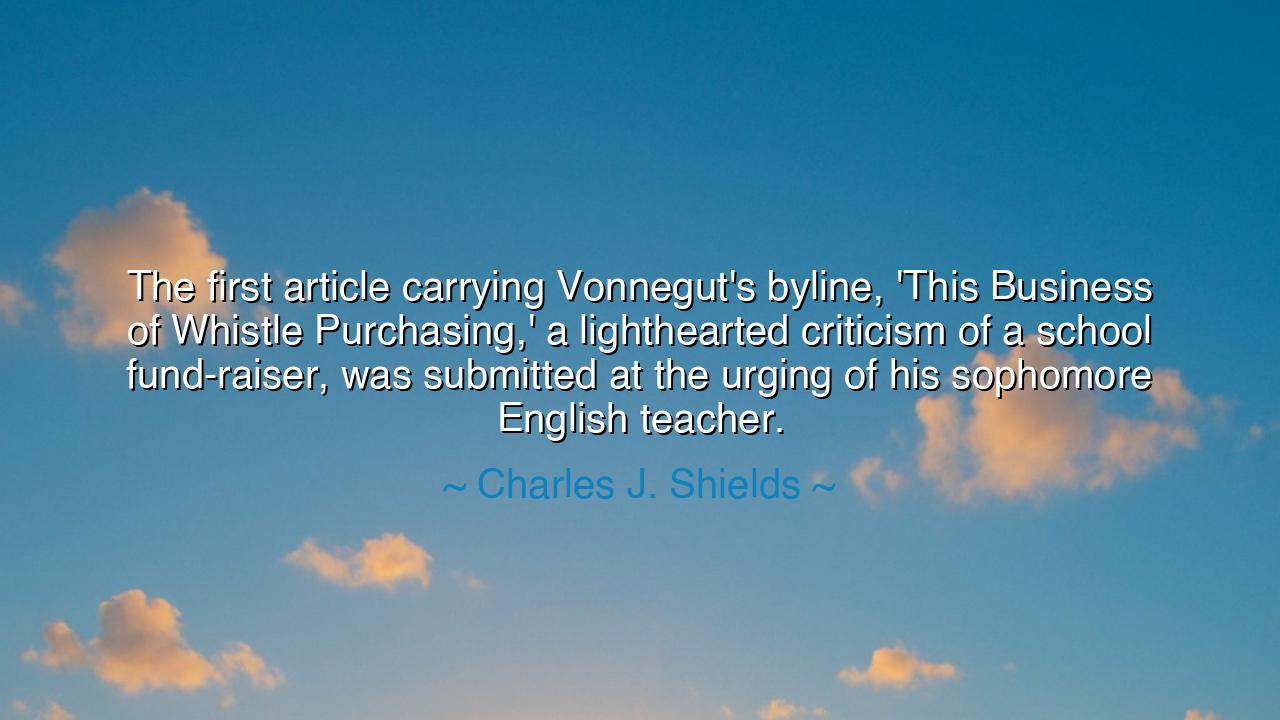
The first article carrying Vonnegut's byline, 'This Business of
The first article carrying Vonnegut's byline, 'This Business of Whistle Purchasing,' a lighthearted criticism of a school fund-raiser, was submitted at the urging of his sophomore English teacher.






The biographer Charles J. Shields, in recounting the early life of Kurt Vonnegut, tells us: “The first article carrying Vonnegut's byline, ‘This Business of Whistle Purchasing,’ a lighthearted criticism of a school fund-raiser, was submitted at the urging of his sophomore English teacher.” Within this simple remembrance lies a profound truth about the power of teachers, the birth of voices, and the mystery of how a spark in youth becomes the flame of genius. For here we see the first trembling step of a boy who would one day become one of America’s greatest satirists, guided by the hand of a teacher who believed in him.
The article itself, lighthearted though it was, foreshadowed what Vonnegut would become. To take a trivial matter—a school fundraiser, the buying and selling of whistles—and treat it with wit and irony was already to show the seed of satire. It was the instinct to laugh at folly, not cruelly, but with clarity, exposing the absurdities of human behavior. This instinct, nurtured by encouragement, grew into the mighty voice that later penned Slaughterhouse-Five and Cat’s Cradle. From a schoolboy’s joke at a fundraiser came the beginning of a lifelong dance between humor and truth.
But what made the difference was not only the boy’s talent, but the teacher’s urging. The sophomore English teacher, seeing in Vonnegut a spark that the boy himself perhaps did not yet see, urged him forward: “Submit it.” Such small words, yet such great consequences. How many voices have remained silent because no teacher spoke those words? How many gifts have withered because no one believed enough to say, “Try, share, let the world hear you”? Here we glimpse the holy task of the teacher: to awaken, to call forth, to midwife the soul into its destiny.
History echoes with similar moments. Thomas Edison, dismissed as slow in school, was encouraged by his mother to learn at home, and from that seed came a world of invention. Albert Einstein, restless and inattentive as a boy, was lifted by a few mentors who recognized in his wandering questions the makings of genius. Mark Twain, like Vonnegut, first published small humorous sketches before becoming a voice of American satire. Each case shows the same truth: greatness rarely bursts forth fully formed, but is called into being by the gentle urging of those who believe.
The meaning of Shields’s words is therefore larger than Vonnegut’s story alone. It is the reminder that the beginnings of genius are often small, fragile, and easily overlooked. A school fundraiser, a scribbled joke, an English class assignment—such things seem trivial, yet they may contain the first notes of a symphony. The duty of the wise is to listen, to encourage, and to see in the seed the possibility of the forest.
The lesson we must carry is this: never despise small beginnings, nor underestimate the power of encouragement. To teachers, parents, mentors, and friends—know that your words may shape destinies. A single urging to write, to sing, to draw, or to speak may awaken a gift that changes the world. To students and seekers—heed the nudges of those who see in you what you cannot yet see yourself. Trust the small steps, for in them lie the paths to greatness.
Practically, let us act with intention. When we see talent in another, let us speak it aloud. When we glimpse beauty in small things, let us honor it. And when we feel within ourselves the stirrings of a gift, however untested, let us dare to share it, remembering that even Vonnegut’s mighty voice began with a playful criticism of whistles.
Thus, the story told by Charles J. Shields is not merely biography—it is a parable. A teacher urged, a boy wrote, and the world received a writer. May we all, in our time, be the encouragers, the listeners, the teachers, who help bring forth voices that would otherwise remain silent. For in such acts, we become co-creators of destiny.






AAdministratorAdministrator
Welcome, honored guests. Please leave a comment, we will respond soon